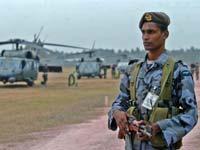Harper accused of hypocrisy when dealing with Sri Lanka

Canadian Prime Minister Stephen Harper, who is pushing for a boycott of the 2013 Commonwealth Heads of Government summit in Sri Lanka unless it improves its human rights record, has triggered a storm of protest in the Asian island nation and its global diaspora.
Harper, who plans to raise the issue next month at Commonwealth Heads of Government Meeting in Perth is backing an independent investigation into alleged war crimes committed by the Sri Lankan army in the final phase of the 26-year civil war with the Tamil Tiger guerillas.
In Canada, Harper’s move has deeply divided the Sri Lankan community with some saying that the prime minister’s actions smacks of hypocrisy and is nothing more than an effort to get the Tamil vote in the Greater Toronto area.
The area is home to the largest Sri Lankan Tamil community outside Asia
In contrast , the Canadian Tamil Congress said that it has been over two years since the war ended in Sri Lanka, and it have yet to see any meaningful progress in investigating allegations of war crimes and crimes against humanity.
The Canadian Tamil Congress echoes the need for an international investigation into credible allegations of war crimes and crimes against humanity committed in Sri Lanka said David Poopalapillai, National Spokesperson of the Canadian Tamil Congress.
Last weekend, the Sri Lankan government inched closer to a possible inquiry, like the one being demanded by Harper and other western nations after UN Secretary-General Ban Ki-moon referred a damning report on alleged human rights abuses and war crimes to the Human Rights Council.
The report, released in April, said the Sri Lankan government was responsible for the deaths of tens of thousands of civilians in the final offensive against Tamil Tiger fighters in 2009 after government troops shelled a declared no-fire zone.
The three-member panel commissioned by the UN, which gathered evidence over 10 months, said that “most civilian casualties in the final phases of the war were caused by government shelling”.
It alleged hospitals and Red Cross ships were shelled, prisoners shot in the head and women raped. It found the Tamil Tigers used civilians as human shields and killed those who tried to flee areas under their control.
The Sri Lankan government has consistently denied the allegations, accusing the UN of bias and lobbying allies such as China to block any moves to censure it.
Harper said he was not satisfied Sri Lanka had done enough to prove its commitment to human rights, democratic values and political reconciliation.
“I have expressed concerns about the holding of the next Commonwealth summit in Sri Lanka,” Harper said. “I intend to make clear to my fellow leaders of the Commonwealth (next month in Australia) that if we do not see progress in Sri Lanka in human rights I will not as Prime Minister be attending that Commonwealth summit. And I hope others will take a similar position.”
Tamil lobby groups are also planning a series of events in Australia to be held in parallel to the October 28 Perth CHOGM summit.
Sri Lanka’s president Mahinda Rajapakse this week condemned “tainted” international allegations of a military massacre of civilians during an assault to end a Tamil rebellion.
“My country has reason for concern with approaches tainted by an unacceptable selectivity, which we have brought to the notice of the organisations in question in recent weeks,” Rajapakse told the UN.
Defending the government campaign, Rajapakse said “after three decades of pain and anguish, today Sri Lankans of all ethnicities living in all parts of Sri Lanka are free from LTTE terror and no longer live in a state of fear.”
He added that after defeating the Liberation Tigers of Tamil Eelam, the government was now working on building “the foundations of a unified and vibrant nation.”
According to Rajapakse, 95% of displaced people from the conflict have returned to their homes in the 30 months since the military campaign and the economy has been revived.
“Contrary to malicious propaganda, the number of armed forces personnel in the Northern Province is at a minimal level,” he insisted.
“We ask our friends in distant lands to drop pre-conceived notions,” he added in another veiled reference to the international criticism.
Writing on Lankaweb, Charles.S.Perera said Canada which has suddenly awakened to human rights issue should open its own old cupboards to see the hidden frightening skeletons that speak a lot of their own past records of human rights.
“Stephen Harper the Prime Minister of Canada jumps like a jack-in-the-box ,calling for progress in human rights in Sri Lanka, Canada itself has no clean record with regard to violation of human rights. So when Canadian Prime Minister Stephen Harper, says if he does not see human rights progress in Sri Lanka, he will boycott the 2013 Commonwealth summit in Colombo, we would ask him first to put his own house in order .”
One editorial in Sri Lanka said “it is certainly hoped that the posturing of Canada’s esteemed Prime Minister will not usurp or jeopardize the CHOGM Summit scheduled for Colombo merely to suit the whims and fancies of an apparently misguided lot as it would be a supreme insult to the integrity of Sri Lanka by someone considered to be a close ally.”
Dr. Bandula Kothalawala of London wrote “ No one disputes Mr. Harper’s right to boycott events in any part of the world, let alone, in Sri Lanka. Nevertheless, the Prime Minister’s reasons and his melodramatic call on the kindred spirits are, at best, gratuitously entertaining, and, at worst, verge on stomach-churning hypocrisy.”









